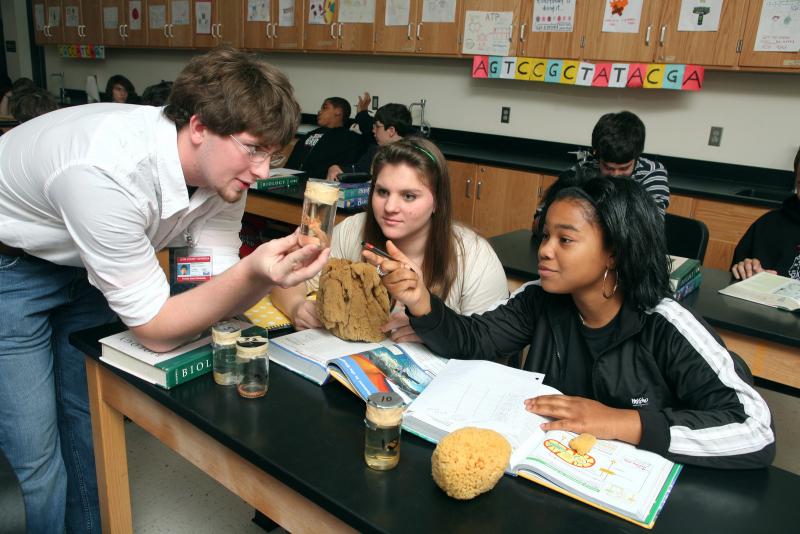
The questions challenging science education today are complex and cannot be adequately addressed through a narrow range of methods. In Florida State’s Science Education program, you’ll develop a familiarity with a wide range of approaches used in educational research to enhance student learning and the field of science education.
Florida State’s graduate programs in Curriculum and Instruction: Science Education will prepare you to address current issues related to learning, teaching, and policy in science education through research. In this program, you’ll learn best practices in science education through interdisciplinary experiences that foster collaboration between education and the sciences. As a student here, you’ll be part of a close-knit group of scholars within a major research university. You’ll learn alongside outstanding faculty who will treat you as a colleague with relevant experience and expertise.
We offer an online master’s degree in Curriculum and Instruction: Science Education for currently practicing teachers. We also offer face-to-face master’s and specialist degrees for individuals who want to perfect their science teaching and/or explore the world of science education research.
The doctoral program in Curriculum and Instruction: Science Education is designed to maximize interactions between faculty and students and focus on current issues of research and practice. It also provides you with considerable flexibility as you pursue your goals and interests. The program also features scaffolded teaching and research apprenticeships to allow you to become a productive researcher and scholar of science education and teacher education.
Please note: These programs are designed for those interested in refining their teaching practices or learning to engage in research in science teaching and learning. If you are seeking teacher certification for Science Education, please see our FSU-Teach program.
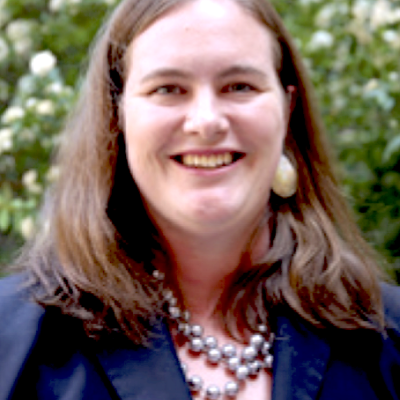
Advisor: Dr. Sherry Southerland
Alicia is a part-time doctoral student interested in undergraduate research. Alicia is also an Associate Director of Florida State University’s Center for Undergraduate Research and Academic Engagement. She earned a BS in Biological Science from Florida State University and an MS in Marine and Atmospheric Sciences from Stony Brook University. Her focus is on
"I love being part of the supportive community in science education and discovering new aspects of learning. Everyone is encouraged to share their unique perspectives and engage in productive intellectual discussions. As a part-time student, who is also a mother and full-time employee, I really appreciate the support from my peers and advisors."
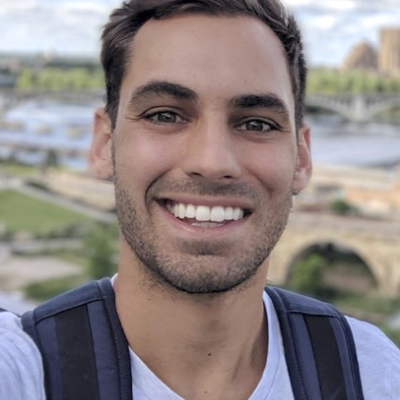
Advisor: Dr. Miray Tekkumru-Kisa
Ryan is a doctoral candidate interested in how novice and beginning science teachers learn to draw out and work on their students’ thinking as resources for learning. His research adds to a growing wealth of knowledge about supporting pre-service teachers’ learning to engage students in meaningful science learning.
"The other grad students in this program have been so important for my own success. There is a grad student culture here that prioritizes sharing and working together on our nascent ideas and works-in-progress, and that’s really special. Being able to talk about ideas I’m not sure about and receive thoughtful feedback has been so critical in my growth as a student and researcher."
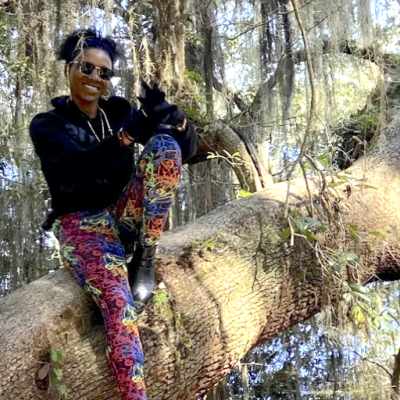
Advisor: Dr. Christine Andrews-Larson
Dionne Gerri W. holds a B.S. degree in Marine Biology from Texas A&M University and is a doctoral candidate in Curriculum & Instruction in Science. Dionne has taught science in formal classrooms, afterschool and summer programs, and at the National Aquarium. Additionally, Dionne is certified to teach multiple SCUBA courses (including but not limited to Open water, Advanced Open War, Dry Suit, Fish Count, and Nitrox) and has taught SCUBA in Texas, Honduras, and Florida. Her research focuses on, 1) the science identity development of Black learners in tandem (or in tension with) their racial identities and 2) the local manifestations of historical discourse on informal scientific spaces.
"I love the deepened enlightenment on systemic inequities that I’ve gained from certain courses and faculty."
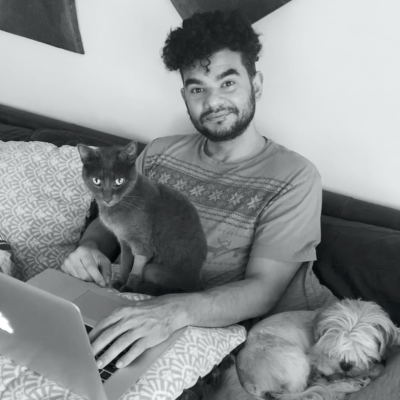
Advisor: Dr. Lama Jaber
I’m a doctoral student interested in using critical theories to support STEM pre-service teachers—particularly those from historically excluded groups—in developing their sociopolitical awareness and anti-racist and equitable teaching practices. Also, I’m interested in highlighting the importance of emotions and feelings involved in teaching and learning. Prior to starting the program, I was a middle school science teacher in Miami and Peace Corp Volunteer in Colombia.
"Throughout my time in the program, I’ve appreciated my advisors' time and effort to cultivate a personal and professional relationship. Also, I owe a big part of my development to my peers, who continue to push me and support me as we navigate higher education together."
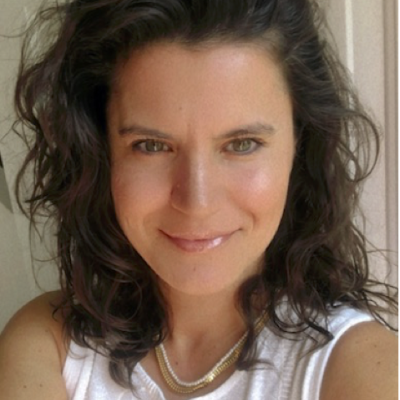
Advisor: Dr. Sherry Southerland
Asli is a 3rd year PhD student. She received her BSc and MSc degree from Middle East Technical University in Turkey. She was a former science teacher at middle school level; she believes her experiences in the classroom play a major role in shaping her research interest. Her research focuses on identifying and understanding elementary preservice teachers’ noticing of students’ thinking and supporting preservice teachers’ future responsive teaching practices in science classrooms.
“As an international student, I am very thankful to my professors and peers for creating a supportive, inclusive and collaborative learning environment. What I really love about my department is that I feel being supported not only for my professional life but also for my personal development and well-being.”
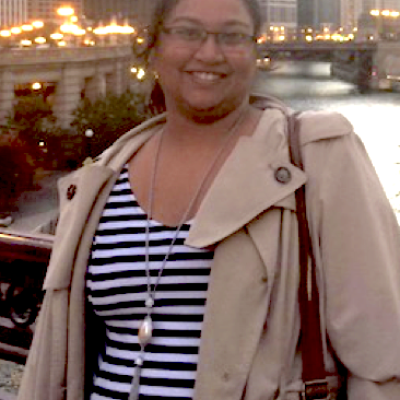
Advisors: Dr. Lama Jaber and Dr. Sherry Southerland
Harini is a fifth-year Ph.D. student in Science Education examining the dynamics of students’ disciplinary engagement in science classrooms. In particular, how the student negotiations along conceptual, epistemological, social, and affective dimensions initiate and sustain or terminate the disciplinary engagement. Prior to starting the program, she got a Master's in Neuroscience from Florida State University and a Bachelors in Biotechnology Engineering from India.
"The encouragement and support that I receive from my advisors, other faculty members as well as peers is what I love and value the most in this program. Also, the structure of the program with its courses as well as research opportunities has challenged me intellectually."
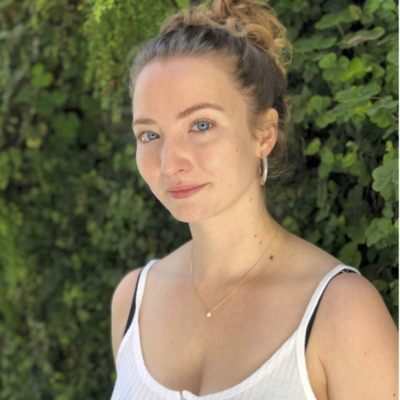
Advisor: Dr. Lama Jaber
Allison is a Science Education Ph.D. student interested in the relationship between epistemic empathy and epistemic justice, and how to support preservice teachers in their development of this empathy. Prior to joining the program, she received a B.S. degree in Environmental Science and an M.S. degree in Science Education from Florida State.
"I really love how supportive and caring the faculty and my peers are in this program. Ever since I started in the Master’s program here, I’ve felt like a valid member of the community. The program is rigorous, but I feel very supported in the work."
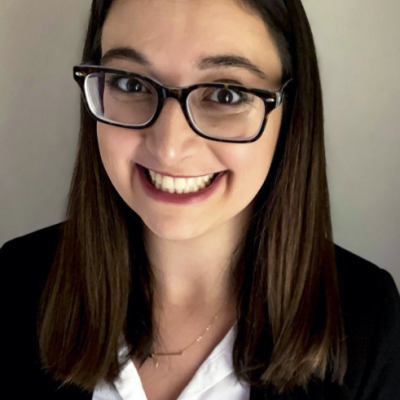
Advisor: Dr. Sherry Southerland
Sierra is a science education doctoral student interested in teacher learning and supporting the creation of NGSS aligned assessments through teacher-researcher collaboration. Prior to joining the science ed group, Sierra graduated from the FSU-Teach program which allowed her to graduate with her degree in biology and secondary STEM education.
"What I love most about the science education program is the support from my peers and the faculty. My ideas are valued and I am constantly challenged by those around me to think deeper and figure out what kind of researcher I want to be when I finish."
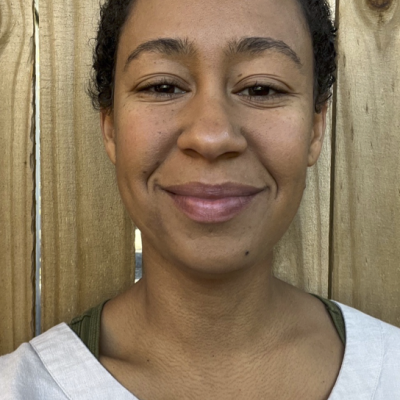
Ivanna is a graduate of Washington University in St. Louis, with a Bachelor's degree in Educational Studies, and of the University of Florida, with a Master's Degree in Agricultural Education. She is currently pursuing her Ph.D. in Curriculum and Instruction in Science Education at Florida State University, where her research interests focus on equity, justice, and healing in science learning contexts. Ivanna’s professional career has centered around supporting the education and growth of marginalized youth, with a focus on those who have experienced the foster care system. Through this work, she studied the skill of empathetic communication, as a tool to facilitate understanding and connection. In conjunction with her academic and professional pursuits, Ivanna is actively engaged in developing an intentional community centered around empathetic communication and sustainable designs.
"I appreciate the ways that faculty members in this department provide empathetic learning supports for the complex journey into academia."
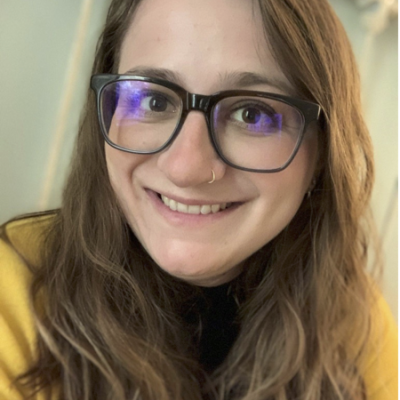
Advisor: Miray Tekkumru-Kisa
Danielle is a doctoral candidate whose research interests focus on teacher learning, and instructional improvement in science classrooms through (1) facilitating rigor in science learning focused on students’ experiences with uncertainty in the service of sensemaking and (2) examining tools and environments that support teacher sensemaking.
"The thing that I love the most about our science education doctoral program is the support that we get from the professors who are a part of our program. Though my research interests have changed dramatically from my first day. They have always supported me in pursuing any research interest that I had."
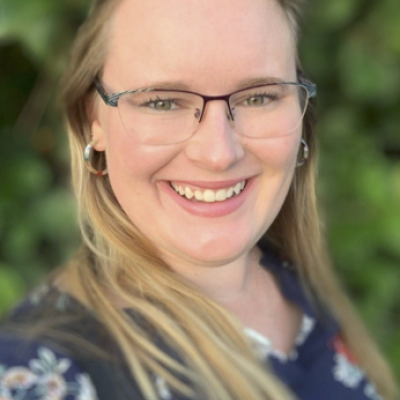
Advisor: Dr. Sherry Southerland
Sam is a 3rd year Ph.D. student who is interested in how undergraduate non-majors biology students wrestle with scientific uncertainty that is present in their lab work and how undergraduate teaching assistants support their students’ wrestling and learning. Her research contributes to the growing understanding of how to engage undergraduate students in authentic science experiences.
"My favorite part about our science education doctoral program is the support I get from my advisors to seek out interesting experiences that will help me in my future career. I do not think I could have sought out some of the opportunities I have without their encouragement."
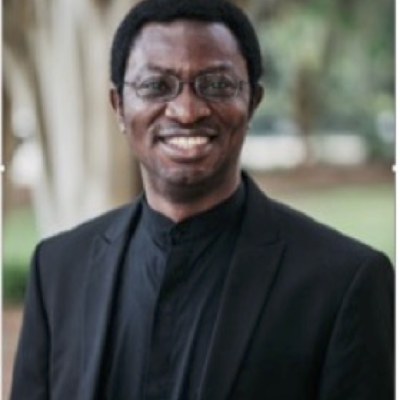
Mark’s experiences in the classroom — both as a student in Nigeria /USA and as a high school teacher/instructor at the post-secondary level in the USA motivated his pursuit of the Ph.D. in Curriculum and Instruction (Science Education) at Florida State University. His academic preparation is diverse: with bachelor’s degrees in Philosophy, Christian Theology, Physics and Education as well as graduate level courses and research in Physics. Currently, Mark is a post-doctoral Research Associate at Cornell University where he works on two NSF-funded research projects — equity, and epistemological framing. The latter is a multi-university collaboration among Cornell, Tuft Universities, and University of Washington, Bothell. In his research, Mark examines small group discourses within innovative pedagogies centering on physics in order to explore dynamics in such discursive groups towards gaining insight into gender and racial (in)equity. He also seeks to understand learner/instructor epistemic positioning in inquiry-based undergraduate physics labs, and Physics TAs’ awareness, framing, and preparedness for gender equitable teaching.
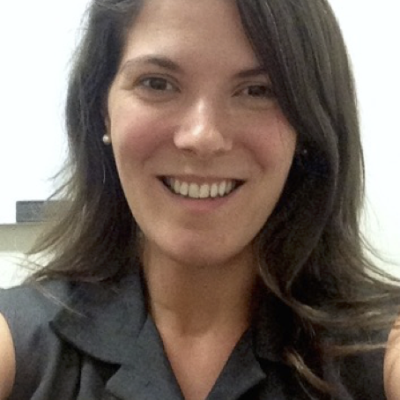
Advisors: Dr. Sherry Southerland & Dr. Lama Jaber
Bio: Shannon is a recent graduate of the science education doctoral program. Her research interests are centered around supporting the development of teachers’ and students’ disciplinary understandings of science, the entanglement of emotions and cognition in science learning, and how this entanglement can shape students’ perseverance and sense of belonging in science. Currently, Shannon is a post-doc at FSU working with Dr. Jaber on an NSF CAREER grant focused on cultivating teachers’ epistemic empathy to promote responsive teaching in science classrooms.
"In addition to the incredible support and collegiality fostered by faculty and fellow graduate students, my favorite thing about the science education Ph.D. program is the intellectual drive of the department, the mentorship offered by faculty, and the way grad students are considered as colleagues and co-thinkers by the faculty from the start. We are pushed to think profoundly and grapple as a community with essential questions in our field while also being allowed time to marinate on new and complex ideas."
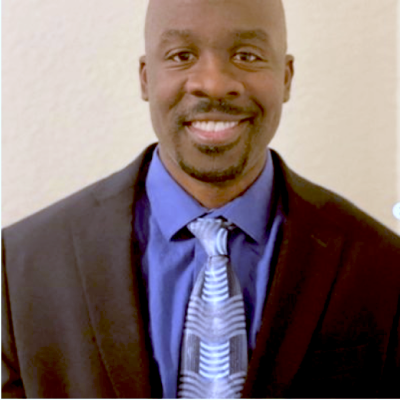
Clausell’s background begins with a Bachelor’s and Master’s degree in physics. Before his time at FSU, he worked in the area of cellular and molecular biophysics. Frustrated with his career, Clausell started teaching physics at both the high school and community college levels. It was then he fell in love with teaching and decided to pursue a Ph.D. in Curriculum (Science Education) at FSU. His dissertation focused on understanding the Challenges and affordances teachers have in implementing Culturally Relevant Pedagogy in the physics classroom. Clausell is currently a postdoctoral scholar at the University of Washington-Seattle where he works on two NSF-funded projects - energy and equity, and conceptual resources. The first project examines how to develop teachers to merge equitable practices in their teaching of energy ideas. The second project researches how instructional materials can be developed to draw upon students' conceptual resources in order to understand physics ideas.
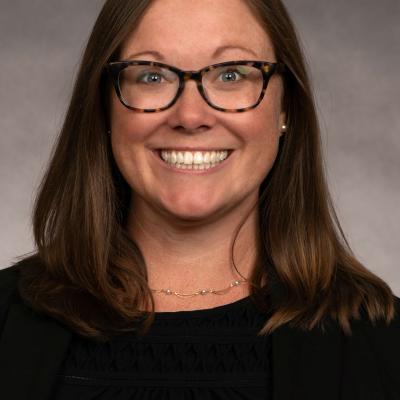
Anna earned her M.S. in Biology from Florida State University in 2012 where, as a graduate teaching assistant for biology lab courses, Anna realized she was most excited to research questions focused on science teaching and learning. Anna continued working for the Biology department while she pursued a Ph. D in Curriculum and Instruction, with a focus in Science Education, in the School of Teacher Education at FSU. In these roles, Anna got to design a lab curriculum and teaching assistant professional development with the biology department and conduct research on teaching and learning in that context for her dissertation. Anna is now an Assistant Professor in the Department of Biological Sciences at Idaho State University with an active biology education research lab. Anna loves exploring biology with ISU’s undergraduate students in introductory biology and biology teaching methods courses, as well as a new course-based undergraduate research experience that she is implementing for the first time with her biology colleagues in 2021/2022. Anna is heavily involved with the Doctor of Arts and Biology Education graduate degree programs in Biological Sciences and offers a rotating sequence of graduate courses on topics in science education research, theory, and practice.
Faculty who advise graduate students in the Science Education program include:
- Lama Jaber: Dr. Jaber’s research explores learners’ engagement in scientific inquiry in various contexts, focusing on learners’ feelings and emotions within that engagement as well as the study and design of responsive teaching classrooms that promote students’ engagement and epistemic agency.
- Amal Ibourk: Dr. Ibourk is interested in finding ways in which elementary students engage in deeper learning when using learning technologies and develop the ability to engage in STEM practices.
- Sherry A. Southerland: Dr. Southerland’s research focuses on the interplay between culture, emotions, and affect in the learning of science, the ways in which instruction and instructors can effectively navigate this interplay, and the barriers and affordances to the adoption of novel instructional practices.
- Roxanne Hughes: Dr. Hughes’ research focuses on how STEM fields and educational spaces can influence students' sense of belonging and perceived success in STEM.
Check out the currently funded projects in Science Education at FSU!
In order to meet minimum University admission requirements, applicants must have:
- A bachelor’s degree with at least a 3.0 GPA – An earned bachelor’s degree from a regionally accredited U.S. institution, or a comparable degree from an international institution, with a minimum 3.0 (on a 4.0 scale) grade point average (GPA) in all coursework attempted while registered as an upper-division undergraduate student working towards a bachelor’s degree.
- GRE test scores*. Official test results are required from the General Test of the Graduate Record Examination (GRE). These scores are considered official only when they are sent directly to the Office of Admissions from the testing agency. Examinee copies are not considered official. Graduate Record Exam (GRE): http://www.ets.org/ – FSU Institution Code: 5219. The Educational Testing Service (ETS) does not retain scores longer than five years. If your test scores are older than five years, you may have to retake the test to have official scores sent directly to FSU from the testing agency. If you have the report that was mailed to your home address for older scores, then FSU will accept that report.
- M.S. and Ed.S. applicant target scores: Verbal – 146+, Quantitative – 140+
- Ph.D. applicant target scores: Verbal – 151+, Quantitative – 145+, Writing – 3+
- *NOTE: The GRE admission requirements for master's and specialist programs have been waived through Fall 2026.
- Language proficiency test (international students only) – FSU accepts scores from TOEFL (minimum 80), IELTS (minimum 6.5), MELAB (minimum 77), Cambridge C1 Advanced Level (minimum 180), Michigan Language Assessment (minimum 55), and Duolingo (minimum 120)
- Transcripts – Applicants must submit an official transcript from each college and/or university attended. Transcripts should be sent to the Office of Graduate Admissions electronically at graduateadmissions@fsu.edu or via mail in a sealed envelope:
Florida State University
Office of Graduate Admissions
314 Westcott Building
P.O. Box 3061410
Tallahassee, FL 32306-1410-
Admission to graduate study is a two-fold evaluation process. The Office of Admissions determines eligibility for admission to the University, and the academic department, program, or college determines admissibility to the degree program. University graduate admissions requirements are found at https://gradschool.fsu.edu/admissions/graduate-admissions. Academic programs have additional requirements.
-
Florida State University requires a course-by-course credential evaluation for all applicants that have degrees from a non-U.S. institution. International and domestic applicants with degrees earned from international institutions must submit their official transcripts through a NACES approved evaluator for transcripts from a non-U.S. institution. SpanTran has created a custom application for Florida State University that will make sure you select the right kind of evaluation at a discounted rate. See the “Transcript Requirement” section on The Graduate School website, https://gradschool.fsu.edu/admissions/graduate-admissions, for detailed information on University transcript requirements for graduate admission.
-
Applicants must upload the following REQUIRED supporting documents to the Admissions Application Portal:
- Statement of purpose – should describe your purpose for pursuing a degree, qualifications and long-term career goals.
- At least one (1) page for M.S. and Ed.S. applicants
- At least two (2) pages for Ph.D. applicants
- Letters of recommendation
- Two (2) for M.S. and Ed.S. applicants
- Three (3) for Ph.D. applicants
- One page resume/curriculum vitae
- Writing Sample – it is acceptable to submit a paper used in another class, or one that was published.
Master’s and Specialist programs:
- Fall: July 1
- Spring: November 1
- Summer: March 1
Doctoral program:
- Fall: December 1 (priority deadline); July 1 (final deadline)
If you are interested in applying, please contact STE-GradCoord@fsu.edu.
Curriculum choices in our master’s and specialist programs are designed to enable students to become teacher leaders, college instructors, as well as curriculum specialists, state testing specialists and textbook company representatives. Doctoral program graduates are prepared to become university professors, researchers and leaders in the field.
According to the U.S. Bureau of Labor Statistics, job outlook for high school teachers is expected to grow 7.5% through 2026, which equates to approximately 79,500 new jobs. The job outlook for instructional leaders/coordinators is expected to grow up to 10.5% through 2026. That translates into over 17,000 new jobs nationwide. The median national annual salary range for instructional leaders/coordinators is $64,450 per year. For university or college professors, the Bureau predicts a 9.9% increase in jobs by 2026, totaling 2,300 new jobs. The median national salary is $79,550 per year.
A career in science education can be very rewarding, and a typical path offers ample opportunities for professional development and growth. Educators make a difference in the lifelong learning experience of their students, as well as, the quality and standards of the programs they teach.


